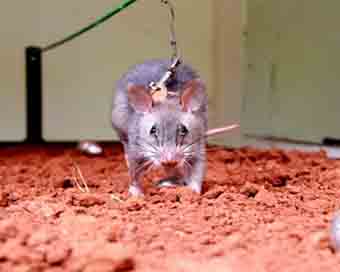Gallery
 PM Modi visit USA
PM Modi visit USA Only the mirror in my washroom and phone gallery see the crazy me : Sara Khan
Only the mirror in my washroom and phone gallery see the crazy me : Sara Khan Karnataka rain fury: Photos of flooded streets, uprooted trees
Karnataka rain fury: Photos of flooded streets, uprooted trees Cannes 2022: Deepika Padukone stuns at the French Riviera in Sabyasachi outfit
Cannes 2022: Deepika Padukone stuns at the French Riviera in Sabyasachi outfit Ranbir Kapoor And Alia Bhatt's Wedding Pics - Sealed With A Kiss
Ranbir Kapoor And Alia Bhatt's Wedding Pics - Sealed With A Kiss Oscars 2022: Every Academy Award Winner
Oscars 2022: Every Academy Award Winner Shane Warne (1969-2022): Australian cricket legend's life in pictures
Shane Warne (1969-2022): Australian cricket legend's life in pictures Photos: What Russia's invasion of Ukraine looks like on the ground
Photos: What Russia's invasion of Ukraine looks like on the ground Lata Mangeshkar (1929-2022): A pictorial tribute to the 'Nightingale of India'
Lata Mangeshkar (1929-2022): A pictorial tribute to the 'Nightingale of India' PM Modi unveils 216-feet tall Statue of Equality in Hyderabad (PHOTOS)
PM Modi unveils 216-feet tall Statue of Equality in Hyderabad (PHOTOS)Hockey India has announced a 54-member core probable squad for the upcoming senior men’s
- Satwik-Chirag return as BAI names 14-strong squad for BWF Sudirman Cup Finals 2025
- Men’s Sr Hockey Nationals to be played in division-based format from April 4
- Mensik denies Djokovic 100th title in Miami final
- KIPG: Son of a vegetable vendor, Bihar’s Jhandu Kumar eyes Worlds, 2028 Paralympics
- Hardik Singh credits hard work and team unity for receiving HI Midfielder of the Year award
Telangana govt says no to glue traps to kill rodents Last Updated : 21 Aug 2021 03:25:28 AM IST 
The Telangana government has issued orders to prohibit the manufacture, sale, and use of glue traps for rodent control.
Director of Veterinary & Animal Husbandry Department Anita Rajendra directed District Veterinary & Animal Husbandry Officers (DVAHOs) and member secretaries of the District Society for Prevention of Cruelty to Animals to follow the directives of the state government and the Animal Welfare Board of India (AWBI).AWBI is an agency under the Ministry of Environment, Forests and Climate Change.DVAHOs were also directed to request that police conduct seizures of glue traps from manufacturers and traders, issue public-awareness notices regarding the ban on the use of these traps as well as using humane methods of rodent control. The circular issued last week also demanded an Action Taken Report within 15 days."The Telangana state decision came in wake of an appeal by People for the Ethical Treatment of Animals (PETA) India that requested the state government to implement circulars issued by the AWBI to prohibit the cruel and illegal use of glue traps," a release said.The AWBI had issued circulars in 2011 and 2020 stating that the use of cruel devices like glue traps is a punishable offence under Section 11 of The Prevention of Cruelty to Animals Act, 1960. Usually made of plastic trays or sheets of cardboard covered with strong glue, they're indiscriminate killers, often catching non-target animals – including birds, squirrels, reptiles, and frogs – in apparent violation of the Wildlife (Protection) Act, 1972. This Act prohibits the "hunting" of protected indigenous species."Mice, rats, and other animals caught in these traps can die of hunger, dehydration, or exposure after days of prolonged suffering. Others may suffocate when their noses and mouths become stuck in the glue, while some even chew through their own limbs in a desperate bid for freedom and die from blood loss. Those found alive may be thrown into the bin along with the trap or face an even more barbaric death, such as by bludgeoning or drowning," PETA India said."The manufacturers and sellers of glue traps sentence small animals to hideously slow and painful deaths and can turn buyers into lawbreakers," said PETA India Advocacy Associate Pradeep Ranjan Doley Barman. "PETA India commends Telangana state for its progressive action, which sets a precedent for the entire country and will protect countless lives."The best way to control rodent populations is to make an area unattractive or inaccessible to them. Eliminate food sources by keeping surfaces and floors clean, and store food in chew-proof containers. "Seal trash cans and use ammonia-soaked cotton balls or rags to drive rodents away. (They hate the smell)," PETA India suggested.After giving them a few days to leave, seal entry points using foam sealant, steel wool, hardware cloth, or metal flashing. Rodents can also be removed using humane cage traps but must be released within 100 yards of where they were found – animals relocated beyond their natural territory struggle to find adequate food, water, and shelter and can die as a result, it added.IANS New Delhi For Latest Updates Please-
Join us on
Follow us on








172.31.16.186







